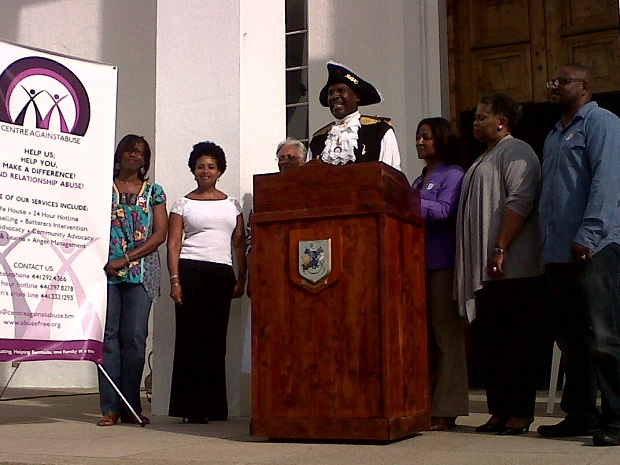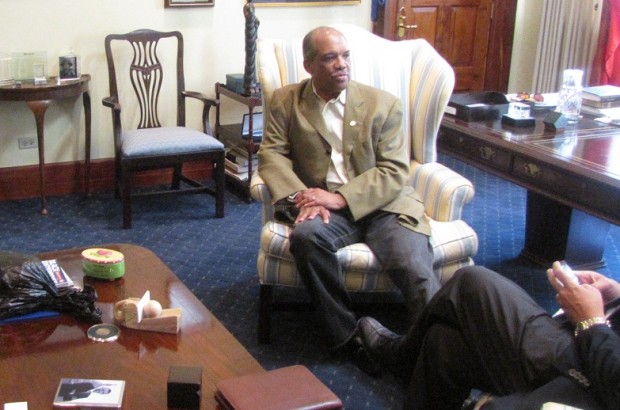Oct Awareness: Breast Cancer & Domestic Abuse
The month of October marks two very important awareness months, both Breast Cancer Awareness and Domestic Violence Awareness.
In a proclamation read out at City Hall by Bermuda’s Town Crier Ed Christopher, October was officially named Domestic Violence Awareness Month.
Events for the month included Denim against Domestic Violence Day which was already held, and saw participants up to the highest level – including the Premier, who undertook his duties in the Cabinet Office donned in jeans, rather than his normal suit-and-tie attire.
There will be other events held for Domestic Violence Awareness Month including:
- Oct 3: Partner Re 5K Run/Walk. Money raised will go towards the Centre Against Abuse’s Safe House.
- Oct 6 & 7: Health Care Professionals will be taught about screening for domestic violence
- Oct 11 – 15: Bullying in the workplace sessions in the community.
- Oct 23: Sybil’s Female Impersonators. Money raised by the event will also go towards the Safe House.
- Oct 24: Health Fair at the Fairmont Hamilton Princess.
- Oct 25: Cut It Out – a programme designed to help hairdressers identify signs of domestic abuse.
- Oct 29: Annual Gala, with the theme of Men Standing up Against relationship Abuse.
Breast Cancer Awareness Month
In addition, October is National Breast Cancer Awareness Month, and the Department of Health and the Bermuda TB Cancer and Health Association are encouraging all women – particularly first-time “mammogrammers” – to get screened for breast cancer. Spokesperson for the Bermuda TB Cancer and Health Association Ashley DaCosta explained the meaning behind the slogan: “Bermuda Cancer and Health Centre is asking women to consider how a few minutes can change their life and the lives of others by taking 10 minutes a month to complete a self breast exam, 30 minutes a year to have their annual mammogram and 60 minutes a year to take part in a fun walk to raise funds to purchase the latest diagnostic equipment.”
Breast Cancer Awareness Month is aimed at both women and men because breast cancer does not discriminate. The Bermuda TB Cancer and Health Association and the Department of Health urges the community to become aware of the screening guidelines and to take a few minutes to consider their breast health.
A spokesperson for the Department of Health said: “As the well-known saying goes, early detection is indeed the best protection. If caught in the early stages, breast cancer can be completely curable – saving your breast and, ultimately, your life. Breast cancer screening is accessible for all – no matter what your financial situation may be.”
For more information contact either Rhonda Smith-Simmons or Ashley DaCosta at the Bermuda Cancer and Health Centre at 236-0949 or 236-1001. Alternatively, people can call the confidential Cancer Information Service 323-2247 and speak to a highly trained Information Specialist who can answer questions on cancer and information on support services in Bermuda. To book an appointment for a screening, please contact the Maternal Health Clinic at the Hamilton Health Centre at 278-6441.
Q&A with the Bermuda TB Cancer and Health Association
1. How long does it take to receive a mammogram?
This can vary from patient to patient, but once a patient is called a screening mammogram usually takes 15 minutes or less while a diagnostic mammogram takes roughly twice as long (30 minutes).
2. Does getting a mammogram hurt?
Mammograms can be uncomfortable, but they don’t take very long. The level of pain experienced can vary from person to person. Planning to have your mammogram shortly after your period makes it less uncomfortable as your breasts may be less tender at that time.
3. What are some of the biggest misconceptions about breast cancer?
One of the biggest misconceptions about breast cancer is that men cannot get diagnosed with the disease. While very rare, it is possible. Men can also be carriers of a hereditary gene that may put their children (especially their daughters) at higher risk for developing breast cancer.
4. How many women are diagnosed with breast cancer in Bermuda each year?
In Bermuda, breast cancer represented 33.3% of all cancers diagnosed island-wide by site, as reported by Bermuda National Tumor Registry in 2009, making breast cancer the most prevalent cancer on the island. 75 women were diagnosed with breast cancer in 2009 according to the Bermuda National Tumor Registry.
5. Is there only one kind of mammogram?
There are two types of mammograms, digital and analog mammograms. Digital mammograms are the preferred method as it is the latest technology and provide a clearer picture than analog mammograms. Digital mammograms also use x-ray radiation to produce an image of the breast, but unlike analog mammograms where the image is stored on film, it stores the image of the breast directly on a computer. This allows the image to be magnified for the doctor to take a closer look.
In addition, women can have a screening mammogram or diagnostic mammogram. Screening mammograms are done for women who have no symptoms of breast cancer. They should be done yearly once a woman turns 40. Alternatively, diagnostic mammograms are used to check for breast cancer after a lump or other symptom or sign of breast cancer has been found. A diagnostic mammogram takes longer than a screening mammogram because it involves more x-rays in order to obtain views of the breast from several angles. The technician can magnify a problem area to make a more detailed picture, which helps the doctor make a correct diagnosis.
6. At what age should a woman begin getting a mammogram?
It is recommended that women over 40 should have routine mammograms annually. If there is a family history of breast cancer, it may be recommended by their doctor that an individual start mammograms earlier.
7. What are some of most common reasons women give as to their reluctance to go for a mammogram?
Some women may be afraid to have a mammogram as a result of a previous experience or experience they have heard of. Having a mammogram can cause a lot of anxiety. However, women should take comfort in the knowledge that 90% of breast lumps found are non-cancerous. Other reasons could include a woman being uninsured or underinsured.



